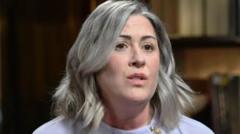Caroline Darian vividly remembers the moment in November 2020 when her life irrevocably changed. "She announced to me that she discovered that morning that [my father] Dominique had been drugging her for about 10 years so that different men could rape her," she recounts in an interview with BBC Radio 4's Emma Barnett. For the now 46-year-old Darian, that call from her mother, Gisèle Pelicot, marked the end of her previous normalcy and plunged her into turmoil.
Dominique Pelicot was eventually sentenced to 20 years in prison following a landmark trial where it was revealed he had recruited numerous men to sexually assault his wife while she was incapacitated. His discovery came about after he was arrested for upskirting, unraveling a shocking web of abuse captured on his devices. Darian speaks of the horrific realization her family underwent; over 50 men were jailed alongside her father for their involvement in this systematic abuse.
Since the trial, Darian has made it her mission to educate the public about the often-overlooked issue of chemical submission—drug-facilitated sexual assault. Her resolve is fueled by personal trauma; she has expressed her belief that she too was a victim of her father's abuse, despite lacking the evidence to prove it. "I know that he drugged me, probably for sexual abuse," she declares, emphasizing the plight of many victims whose experiences go unacknowledged.
In light of her experiences, Darian has penned a book titled "I'll Never Call Him Dad Again," documenting her family's struggles and shedding light on the broader issues of sexual violence and the normalization of such crimes. She hopes her story will offer support to others who find themselves in similar situations; she asserts that the initial disbelief many victims face often compounds their trauma.
Her mother, Gisèle, once an unaware victim of her husband, has become a prominent figure in raising awareness about these issues. Darian recounts how Gisèle's decision to publicly share their story was pivotal, lending courage and strength to the family as they navigated the challenges of the trial together.
As they work through their trauma, Darian admits that she cannot reconcile the image of her father with the man she once knew. She remarks that her relationship with her father now feels like a distant memory overshadowed by his criminal reality. "When I look back I don't really remember the father that I thought he was," she reflects.
Today, Darian channels her energy into advocacy, aiming to enlighten children about the dangers of sexual abuse and the intricacies of drug-facilitated assaults. She draws strength from her close-knit family, including her husband and young son, as they move forward from the shadows of their past. Darian asserts that her father is not a monster but rather a "dangerous man" who must remain imprisoned as she embarks on a journey toward healing and justice for invisible victims everywhere.




















